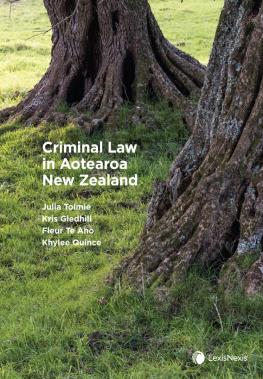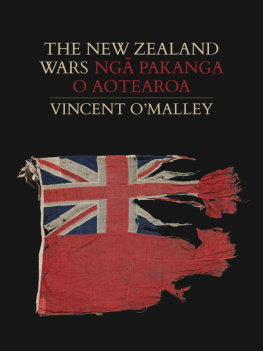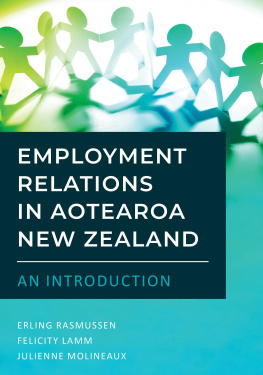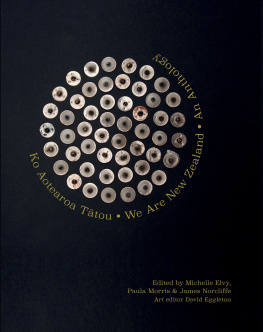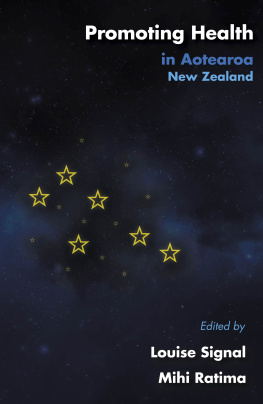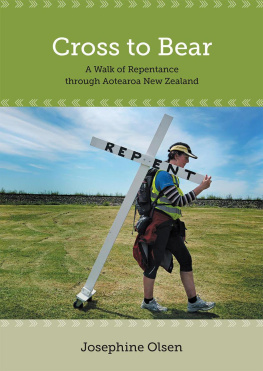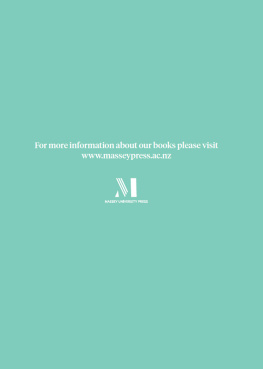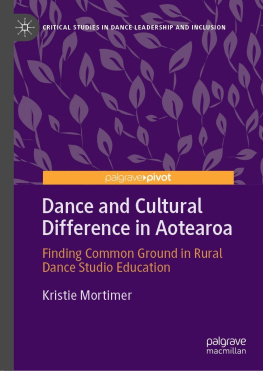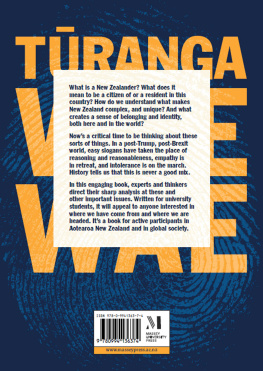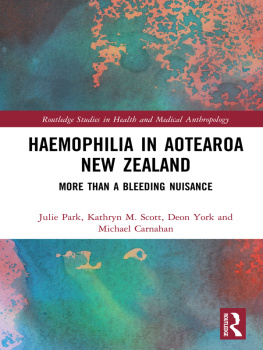


Published by Otago University Press
Level 1, 398 Cumberland Street
Dunedin, New Zealand
university.press@otago.ac.nz
www.otago.ac.nz/press
First published 2015
Copyright the authors as named.
Volume copyright Otago University Press
The moral rights of the authors have been asserted.
ISBN 978-1-877578-23-6 (print)
ISBN 978-0-947522-30-8 (Mobi Kindle)
ISBN 978-0-947522-31-5 (EPUB)
ISBN 978-0-947522-32-2 (ePDF)
A catalogue record for this book is available from the National Library of New Zealand. This book is copyright. Except for the purpose of fair review, no part may be stored or transmitted in any form or by any means, electronic or mechanical, including recording or storage in any information retrieval system, without permission in writing from the publishers. No reproduction may be made, whether by photocopying or by any other means, unless a licence has been obtained from the publisher.
Publisher: Rachel Scott
Editor: Imogen Coxhead
Design/layout: Fiona Moffat
Index: Diane Lowther
Original cover art by Simon Kaan, Dunedin
Ebook conversion 2017 by meBooks
CONTENTS
1. INTRODUCTION: MULTI-MULTICULTURALISMS IN THE NEW NEW ZEALAND
GAUTAM GHOSH
The Tiger has no need of Tigritude. In other words, Tigritude appears necessary only at the point where two uncertain beasts mirror themselves in each others exiled eyes. FRANTZ FANON
In the twenty-first century multiculturalism is a key lens through which some persons and polities envision themselves and each other. Aotearoa New Zealand is now more culturally diverse than ever. Yet in both popular and academic circles multiculturalism has received comparatively less attention here than in other countries.
This book is based on a symposium entitled Interrogating Multi-culturalism in Aotearoa New Zealand: An Asian Studies Perspective, convened by the University of Otago in Dunedin, New Zealand. The aims of the symposium were first, to stimulate discussion about multiculturalism, and second, to do so with particular attention to the histories and circumstances of Asians that all-too-generic label for what is a diverse group in Kiwi society given the roles Asians have played in the new immigration patterns since the late 1980s.
Debating multiculturalism in Aotearoa New Zealand is exigent precisely because here, as elsewhere, it is not a singular phenomenon, as the title of this chapter, and the chapters to follow, underscore. There are many ways terms such as multicultural and multiculturalism are debated, defined and deployed. Likewise here as elsewhere multiculturalism is a fraught and vexing issue. There are arenas of debate in multiculturalism where people see eye-to-eye, but many where they do not. The aim of this volume is to clarify how and where these confluences and contentions are visible in Aotearoa. Insofar as the tensions among the volumes chapters point to tensions in multiculturalism, each can shed light on the other.
Section One of this chapter offers my general observations on the initial aims of the symposium and the book and some broad reflections on the chapters. In Section Two I provide more detailed interpretations of the chapters and highlight myriad kinds of multiculturalism as these manifest themselves in, through and about Asians in Aotearoa, and in the scholars different modes of analysing such phenomena. My aim throughout is to interpret the chapters and consider how they indicate avenues for further reflection and research. Finally, in Section Three, I point to some leitmotifs in the volume, closing with some particular reflections on the relation between multiculturalism and the nation, on the one hand, and the role of vision itself in framing multiculturalism on the other.
Section One: Diversity and its discontents
Discourses of multiculturalism have emerged in the last decades as a way of speaking about, more often than not, cultural and ethnic
If different multiculturalisms vary depending on the character of the nation and, especially, the nationalism to which they are related, what is the character of New Zealand? Is the country, as some of our authors hold, a European (in other words Western) nation? Is this Europe resurgent or in decline? Is Aotearoa an Asian country, as declared by former Prime Minister Jim Bolger in 1993? And, if so, is it part of what some have called the Asian Century? Perhaps the nation is at once, and uniquely, both Oceanic and OECD. How character is defined and discerned will change with the commitments political, ethical, economic, aesthetic and so on of those doing the characterising.
Insofar as the country has seen itself as European it must be noted that key European leaders have been highly critical of multiculturalism in the recent past. Multicultural projects have been rebuked by the German Chancellor Angela Merkel, by Nicholas Sarkozy, ex-President of France and, perhaps most significantly for a Commonwealth member country like Aotearoa New Zealand, by David Cameron, Prime Minister of Britain. In a 2011 speech he stated, We have encouraged different cultures to live separate lives, apart from each other and the mainstream We have even A key member of Camerons cabinet eventually apologised for comments that seemed to support the conspiracy theory. Although Aotearoa New Zealand has not witnessed controversies of this scale and (dis)repute, multiculturalism is not without its contentions, as the chapters here make abundantly clear.
The chapters also show that different groups in New Zealand have different understandings of multiculturalism. Whether multiculturalism is an ism like, say, nationalism or capitalism or an institutional arrangement, a form of subjectivity, a demographic description, a threat or an opportunity, will differ depending on how particular polities and their segments articulate their investments and interests. It is also important to consider that communities overlap: communities of commerce can also be, in significant and specific ways, communities of religion, of urban proximity, of electoral inclination. From my socio-cultural anthropological perspective, attending to these contexts and contingencies is crucial in order to avoid de-contextualisation and reification.
The Dunedin symposium sought to address multiculturalism from an Asian Studies perspective; the papers submitted focused on forms of multiculturalism within New Zealand.
The idiom of interrogation as a mode of inquiry suggests a different sort of relationship between the knower and what is known and, indeed, what it means to know. It suggests relations between subjects, or agents, and foregrounds the dialectical and dialogical relations among them. Interrogation also suggests that the dynamics of power in generating knowledge must also be considered, and vigilantly so, as the forms of this power are protean and, though the deleterious dimensions of power can be mitigated, they cannot be eliminated altogether; the latter would be a utopian ideal. The knower is in the privileged position of interrogating, of presenting and deciding on questions to pose to the witness (or suspect?) and, thereby, to elicit certain sorts of answers. This is also to concede, in a sense, that a different interrogation (or cross-examination) could produce different answers and different accounts, even if the same facts are at hand and the same questions are posed. The notion of interrogation is thus in tension with one that takes the world as composed of objects and objective facts that, ultimately, through unilateral analysis, become instances of general principles, as the falling apple instantiates gravity. Interrogation is a process, with a significant hermeneutic component, that emerges as uncertain subjects mirror themselves in each others exiled understandings and agendas.





